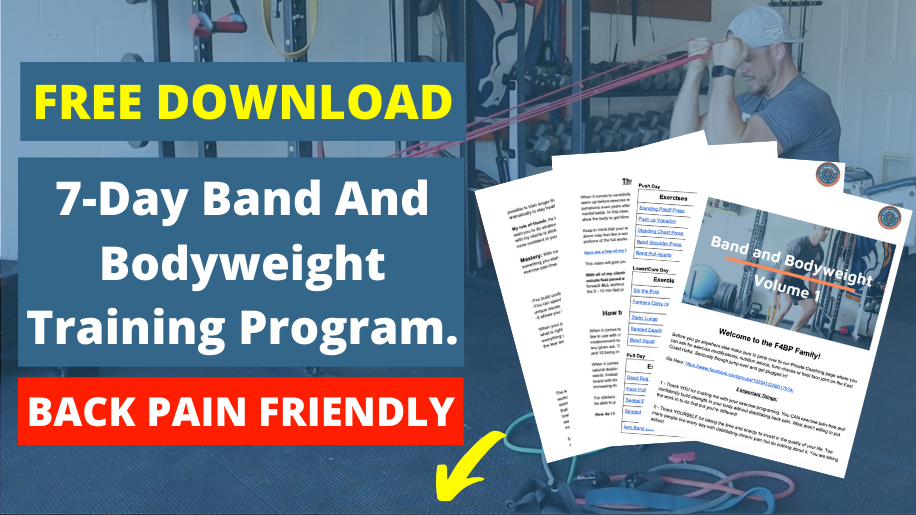To most back pain sufferers, hearing the results of their MRI scan can be heart wrenching. Our trusted medical professional convinces us that getting the MRI scan will give them exactly what they need to “diagnose” our pain. We fork out the hundreds, sometimes thousands of dollars out of pocket, convinced that it’s a good investment since it will lead to the answer to our pain. I was sold twice by my trusted doctor and forking out hundreds of dollars from my own pocket when I was only 22 years old. If I could tell that 22-year-old what I know now, my life would have been different.After today, you will know why your MRI results are not going to get you the answers you desperately need, and what your next steps should be to getting to the bottom of your pain.
“When all you have is a hammer, everything looks like a nail”
When I first discovered how uneducated a lot of our medical professionals are when it comes to treating back pain. I was fueled solely on anger to prove them wrong. I was convinced they were all clueless on what really matters and only cared about referring their services and filling up medicine cabinets and operating tables. Years have gone by and I have come to realize it’s really us the sufferers who are the uneducated. Doctors are only doing what they are trained and “programmed” to do. Sure every once in a while you might get some wild hair who goes against the grain and spends more time on the things that matter but I guarantee he/she is looked down on by his peers and the industries “higher-ups”. As a fellow back pain sufferer, I am here to tell you, the responsibility is in our hands. Instead of being a pawn, shuffled around by these doctors, we need to press back and ask questions.
Not being a doctor myself I would never tell someone NOT to have an MRI scan done but what I will say is if you’re looking to find a solution to your back pain and your doctor is saying they will be able to find your solution soley off that, it’s time you really consider seeing someone else.
What is an MRI Scan?
An MRI or Magnetic Resonance Imaging is radiology technique that uses magnets, radio waves and a computer to capture an image of different structures under the skin. Some MRI scan devices are in the shape of a tube that has a bed that can be sent into the tube for scanning. Other models, I have been scanned by are more cloister-phobic friendly, which don’t completely enclose your body within a tube. The science behind these strange clicking and banging machines is quite simple. The tube you’re sent into or that surrounds you is a giant magnet which creates a strong magnetic field that aligns the protons of hydrogen atoms, which are then exposed to a beam of radio waves. This spins the protons of the body, and they produce a faint signal that is detected by the receiver portion of the MRI scanner. After all that magic, you would think you would have super powers when you get out. You don’t.
If you really want to geek out, check out the video below!
“MRI scans are over prescribed and their results are given too much weight”
The problem with the medical industry is that doctors are hinging solely on the results they are getting from these scans. Take a client of mine for example. After spending hundreds of dollars just to get a specialist to review his results the doctors told him that he was going to need a level 2 fusion. No movement assessment or discussion of poor habits that could be keeping him on this chronic pain cycle or anything. They went straight to the fusion. Just a “simple” level 2 fusion that would literally change his life forever (not necessarily for the better).
This happened with me and I know there are thousands of people who are seen by their doctors for basic low back pain who are convinced that they need something major done simply by going off the MRI results alone. You as a back pain sufferer need to know that you have more options. Don’t let your doctor convince you that since your discs are a little dark and you have two herniations that the operating table is your best bet!
Paul Ingram over at painscience.com touches on this topic very well along with a lot more of the supporting science behind the MRI being done for back pain treatment. Check it out!
Why MRI scans are not good for diagnosing low back pain.
The thought process behind the MRI scan is that if they can see physical damage to someone’s spine than the doctor will have something to blame the pain on. He/she doesn’t have the time or knowledge base to do a movement assessment with them or talk about poor movement habits. It’s easier to shuttle you and your insurance card to their scheduling desk and begin another generic diagnosis protocol like all the rest. The problem with this is that the MRI scan isn’t going to show the doctor that you work at a desk all day hunched over at a computer screen. It also won’t tell the doctor how many times you bend over picking up your kids toys, clothes baskets and pushing the vacuum around the house a day. Those results aren’t going to explain to the doctor the years of poor standing mechanics you have developed due to years of muscle imbalances and poor posture.
Instead, these MRI scans will show the doctor a degenerative spine, spinal stenosis and maybe even a disc herniation which will start this over prescribed attempt to “fix it”. What drives me crazy is that all this $500,000 machine does is show the end result from years of accumulating poor habits, postures, and movements over their lifetime. It’s like a mechanic replacing the brakes on your car every month. Instead of looking into why your brake pads are wearing out so freakin fast, they just “fix it” and send you on your way. Find out what’s causing the brakes to wear out so fast and you will really help someone out! When it comes to back pain, the doctor points to the damage on the MRI results and says AHA, that’s why you’re in so much pain! Now that we know what’s going on, we either cut it out or send you through our time tested therapy protocol that we print from books made in the 60’s.
Getting an MRI scan is not only a foggy way of addressing back pain but it’s a sure-fire way to send you into panic mode.
I was 23 years old when I sat in the office of the most respected spine specialist in my area. He told me that I had a “rupture” of my L5-S1 along with some disc degeneration. From that moment on I blamed all of my pain on that “ruptured disc”. It just made sense. It hurt when I bent over because my disc was ruptured and my spine was degenerative. It hurt to roll out of bed because my disc is ruptured and my spine is degenerative. This story I kept telling myself went on and on until I had to physically change the way I spoke about my problem. It’s no wonder people are so quick to sign up for surgery and medicated pain management. They are told that their spines are broken and need to be “fixed”. Just like you fix a flat tire. Every specialist I went to I proudly carried my MRI scans as if they were a badge of courage proving to whoever looked that my pain was very real and it was all because of what these MRI results showed me.
Man, I wasted so much time thinking this way.
You have to have this same mental shift that I had if you want to find long term relief. You have to stop blaming it on what your MRI results are telling you and start looking deeper. The MRI results are showing you the aftermath of an accumulation of things done over a long period of time. If you got an MRI done that’s great just don’t allow that to be the last nail in your coffin. Immediately seek out people who support what you want for your pain recovery. If you want to be on medication and have surgery after surgery then join one of these groups you find on Reddit or Facebook. Nobody talks about what they can do to stop the pain cycle. They just talk about what medications they are allowed to mix and who has the worst surgery story.
We have to break this cycle.
When are MRI scans useful?
With just about any one of my clients. I ALWAYS want to see some kind of medical diagnosis of what their trusted medical professional is telling them is the issue. Most of these come in the form of X-Rays and MRI’s and that’s totally fine. It’s almost better in a sense because it’s proof that they did actually go get a doctors opinion.
There are more and more studies and clinical recommendations being published on this exact topic. Most doctors will normally send anyone with lower back pain to get an MRI done to rule any major damage out. Which I agree with if all they are doing it for is to RULE OUT any major issues. According to American College of Physicians and The American Pain Society MRI scans really should only be used in worst case scenarios. There are some cases where back pain is so severe that the patient can hardly sit, stand or walk, their legs have gone numb or have completely lost control of their bowels. This is a great example of when a scan can be extremely helpful. They allow the doctor to look into the patient’s body and see what is going on with the structure of the spine to help pinpoint the best course of action. Again, this is NOT the case for the majority of back pain sufferers. In these rare, emergency situations the MRI machine is your friend.
So, my doctor/specialist/surgeon insists on me getting an MRI done before he gives me ANY kind of diagnosis or insight into why I have this excruciating pain, What should I do?
Arm yourself with as much knowledge as you can.
I personally lived through this exact situations. I have been sold numerous MRI’s by numerous specialists all coming to the same conclusion and generic treatment plan. Being right here right now and reading this is the absolute best thing you could do for your situation and dealing with what steps you will take with, your doctor or without.
I want to leave you with something you can physically take with you and approach any doctor you see regarding your back pain. Whether it’s your surgeon, Physio, Chiropractor, or Physical Therapist, these questions can apply to anyone looking to “treat” your back pain.
Hot Point Questions/Discussion Topics for You and Your Doctor.
(Printable version at the end of article)
A good Doctor will NEVER be upset about you asking questions. Regardless of how many you have.
-General Questions
1 – What is the cause of said diagnosis? (herniation, bulge, degeneration)
2 – How will this medication fix my root cause?
3 – Since some spine abnormalities are normal for an aging spine how are measuring mine being problematic?
4 – If you “cut out or fuse” my spine how will that keep me from generating more abnormalities later?
5 – Do you believe that poor posture, habits, and movement mechanics could have caused this issue? If yes, wouldn’t spending time fixing these be more beneficial to me than just treating the end results (herniation, bulge, etc.)?
-Questions for Physical Therapist, Physiotherapist, Chiropractor etc.
1 – What specifically will these exercises do to fix what I have going on? What are they correcting?
2 – What is your treatment philosophy? You want someone who cares just as much about your posture, daily habits, and movement mechanics as they do you doing the stretches they provide.
3 – What experience do you have in treating my specific situation?
4 – Aside from stretches and exercises can you analyze my movement mechanics and tell me what I am doing wrong and what I should do to fix it?
5 – Why are you prescribing these specific exercises and how do they apply to my situation?
6- Given my diagnosis, what specific movements\activities should I stay away from while I heal?
Questions/Tips regarding talking to your surgeon
1 – Focus more on talking to the nurses and Physical Therapists at the hospital to see which surgeon has the highest success rate.
2 – Ask questions around other patients “long-term” success rates. Short, term success rate is not concrete and can change within days, weeks or months.
3 – Ask the surgeon how many time he/she has done this specific procedure. The more times he/she has done the procedure the better.
4 – If he/she is talking multi-level fusions ask why compared to just one or two levels. If he is hell bent on multi-level, get a second and third opinion elsewhere.
5 – Your doctor should always give you multiple options when it comes to your treatment along with the risk reward of each one. If all they give is one (surgery), search elsewhere.
6 – Don’t be a guinea pig. If this is a “first attempt” for the doctor, don’t let it be on you.
Repeat surgeries should be avoided at all costs. Most repeat surgeries happen because the first one shouldn’t have been done in the first place.
*The surgery section to this print off was taken from Dr. Stuart McGills book Back Mechanic.
This document contains over 18 questions your doctor is not expecting. You should feel like you are in control of your pain management journey. The more you are prepared the more likely you are able to make the best decision possible regarding your recovery.
-Click the image or this link to be able to print this list of essential questions.-
My hopes for this article is to once again take the power out of your doctor’s hands and put it into your hands. I don’t want you to think that doctors are worthless and can’t help you solve your back issue but it’s smart to be well equipped and well aware of some unnecessary things the medical industry will put you through. Any test and diagnosis is best to be done by your trusted medical professional but DO NOT let him/her diagnose you simply from looking at your MRI scans. This is NOT what you want your treatment plan to be solely based off of. If your doctor is diagnosing you solely off of what they see on your scan, it’s time to look elsewhere for your treatment. There are lots of trusted professionals who are happy to look at your results but most importantly look at multiple angles when it comes customizing your specific treatment plan.
If you have a visit with any doctor regarding the diagnosis and or treatment of your lower back pain take these questions with you and make sure you understand exactly what’s going on.
Thanks for reading!
If you know of anyone thinking about going under the knife for their back pain or currently seeing doctors, share this with them. The more they can know going into their treatment the better. They could literally have a better life because of something you took the time to share with them.
ttys,
William






Do you know a different site for C fusions? Some of the information here is great but not as relative to the C fusions.
Thanks so much for any helpful insights, I had the fusions 10 years ago and still battle anytime I lift more than 5 lbs. Every time we try to strengthen to reduce flare ups I end up with ice packs and gabapentin. And I am not interested in another surgery just a life style without constant discomfort Motrin, ice and worry as to when a flare up is going to strike next.
Tammy, I don’t, I’m sorry.I don’t think there is one. C fusions are not that different other than he location. The main principles are the same. If you did some one on one coaching you could get a little more detailed guidance with what you have going on. Have you worked with a trainer before?